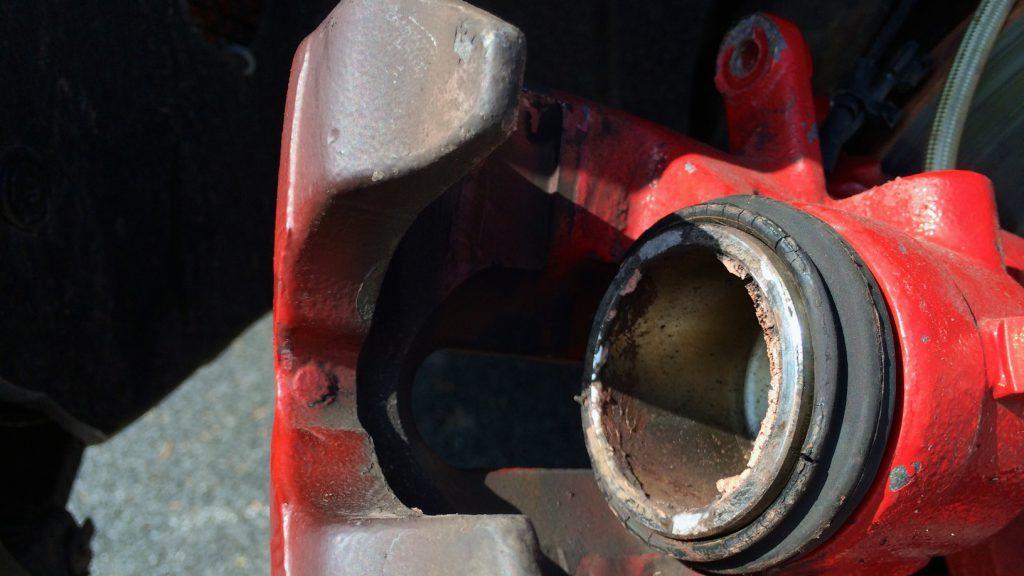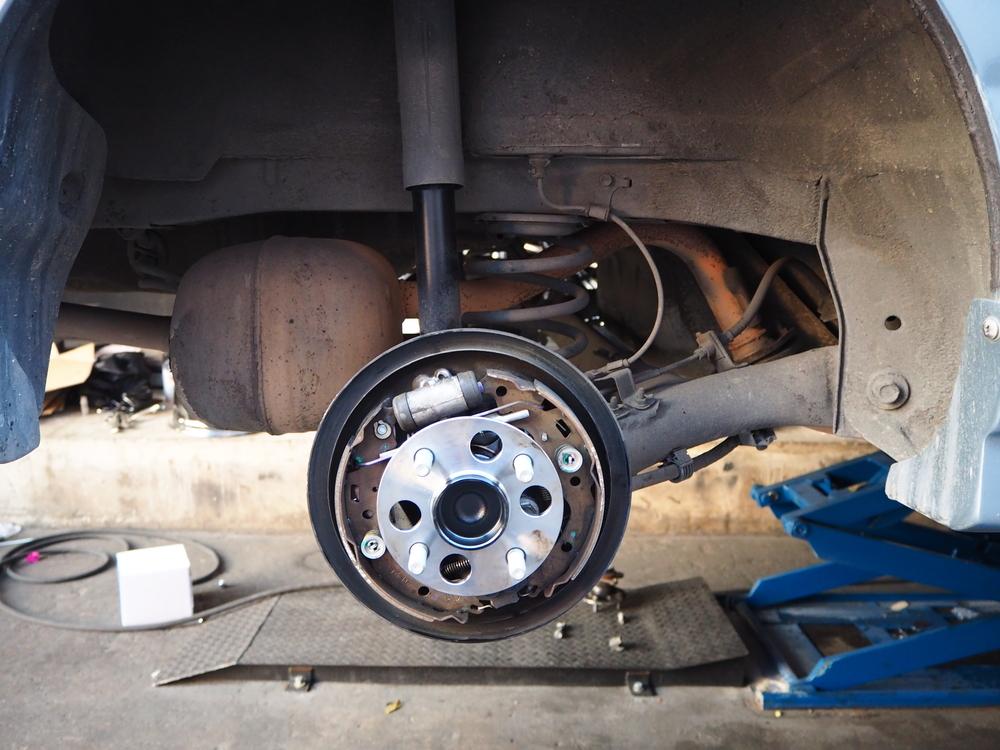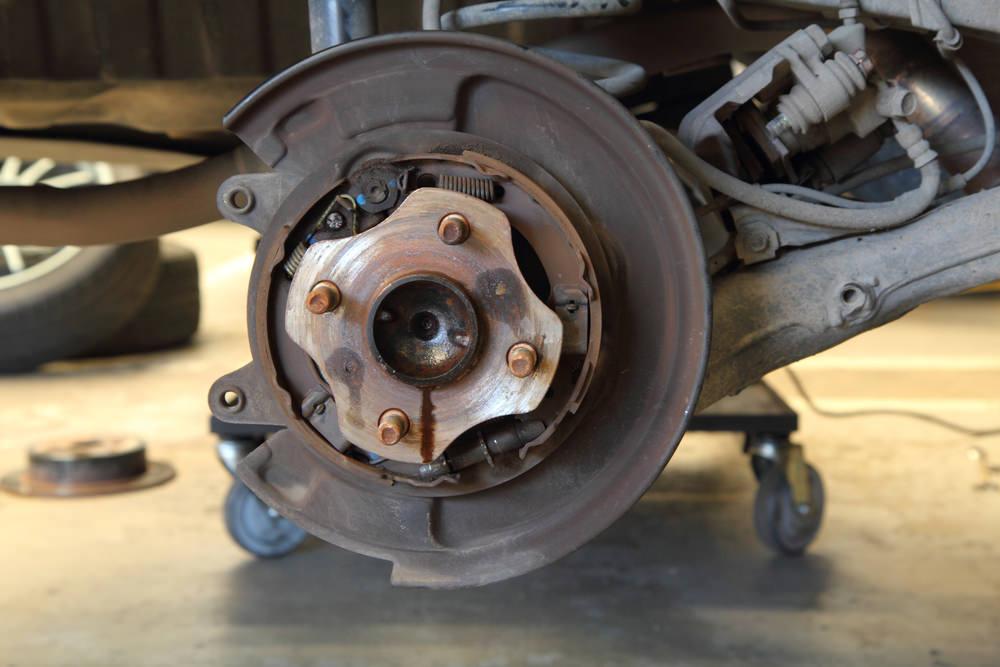What to do when your brakes lock up? First of all, it’s a scary situation if you are driving. Having no control of the car that is speeding down the road is downright dangerous. It still could be expensive repair work even if you are not driving when brakes locked up on car.
Learn why do brakes lock up and what you can do when this happens. Remember that if you have no mechanical skills, tow the vehicle to an auto repair shop to get the best service.
Contents
What Causes Brakes To Lock Up?
There are several reasons that can trigger this unfortunate event. Things that can cause brakes locked up while driving or not are:
- Overheated braking system
- Using incorrect brake fluid
- Misalignment of the power brake booster rod
- Damaged or broken calipers, rotors, or drum brake backing plates
- Defective ABS component, proportioning valve, or parking brake mechanism
- Worn off caliper pistons or brake wheel cylinders

SEE MORE:
What To Do When Your Brakes Lock Up?
What you should do will depend on how many wheels are locked up. Lift the car with a jack and rotate the wheels by hand.
It could be a mechanical issue if only one wheel is rigid. Look for a clogged fluid pipe or a broken spring.
A jammed pipe transfers the fluid to the wheel cylinders but blocks it to return when you release the brake pedal. For this reason, the brakes stay ‘ON’ and appear to be locked.
A jammed handbrake could cause the locking of both wheels on the same axle. It mostly happens to the rear wheels because the handbrake works on the rear axle.
How to unlock brakes when all wheels are locked? In that case, a defective or misaligned master cylinder is likely to be the reason.
What To Do When Front Brakes Locking Up While Driving?
What causes brakes to lock up while driving? It happens when you lose control while driving on a slippery surface and slam on the brakes in a desperate attempt to stop the car. Doing so will only jam the braking system and leave you helpless barreling down the street.
What to do when your brakes lock up?
If the car does not have ABS brakes, release the brake pressure when you realize that it starts locking. Keep pushing and releasing the brake pedal in quick succession until the vehicle stops.

A vehicle with ABS brakes is unlikely to lock up unless a component in the system is kaput. Damaged disc brakes, calipers, rotors, wheel bearings, and a handful of other parts can cause the lock up.
An ABS-equipped car will prevent locking automatically when you start losing grip on rough tracks. It will pump the brakes so you don’t need to do anything.
All you will feel is a beating sensation in the brake pedal at the time of hard braking. Just ignore it and keep the pressure on the pedal to bring the car to a safe stop.
FAQs
-
How can I prevent my brakes from locking up?
Preventing brake lock-up involves adopting good driving habits, such as gentle and progressive braking, as well as routine brake maintenance. Regularly inspect your vehicle’s braking system and ensure that the ABS is functioning correctly.
-
What immediate action should I take if my brakes lock up while I’m driving?
If you find yourself in a situation where your brakes lock up, the first step is to release the brake pedal immediately.
Next, steer your vehicle in the direction you want to go, avoiding abrupt movements. Gradually reapply the brakes with less pressure to regain control.
-
Is it safe to continue driving with locked-up brakes?
No, it is highly unsafe to drive with locked-up brakes. Doing so can lead to loss of control and accidents. Prioritize releasing the brakes, regaining control of your vehicle, and addressing the underlying issue before resuming your journey.
-
How can I determine if my ABS is malfunctioning?
Malfunctioning ABS can often trigger a warning light on your vehicle’s dashboard. Additionally, if you experience uncontrolled wheel skidding while applying the brakes, it could be a sign that your ABS system is not working correctly.
-
Should I pump the brakes if they lock up?
It is important not to pump the brakes if they lock up. Instead, use a steady and gentle application of the brake pedal to regain control. Pumping the brakes can exacerbate the problem, especially if your vehicle is equipped with ABS.
-
What should I do if my brakes lock up in adverse weather conditions, such as rain, snow, or ice?
In slippery conditions, such as rain, snow, or ice, brake lock-up can be more challenging to handle.
In such situations, release the brake pedal, steer into the skid (the direction the rear of the vehicle is sliding), and apply the brakes gently to regain traction and control.
-
Is it advisable to attempt fixing locked-up brakes by myself?
Fixing locked-up brakes is a complex and potentially hazardous task. It is recommended to seek the expertise of a qualified mechanic for proper diagnosis and repair.
Attempting to fix brake issues without the necessary knowledge and tools can pose risks to your safety and the functionality of your vehicle.
Check out this video from Barbour’s Auto Help to learn how to diagnose a locked up brake caliper and/or dragging brakes for one wheel!
Conclusion
When your brakes lock up, it can be a frightening experience, but knowing how to react can help you stay safe on the road.
So in the end, what to do when your brakes lock up? The key is to remain calm, release the brake pedal, and steer in the direction you want to go. Avoid harsh or sudden movements that can worsen the situation.
If you’re unsure about the condition of your brakes or if they repeatedly lock up, consult a qualified mechanic to diagnose and fix the issue, ensuring your vehicle’s safety.



